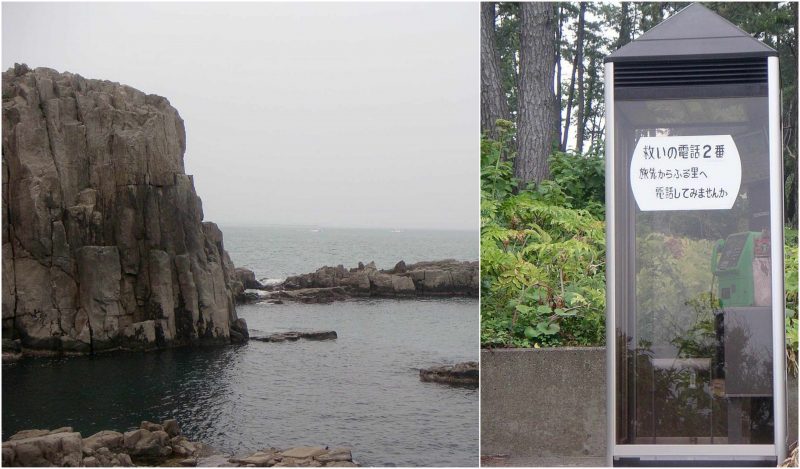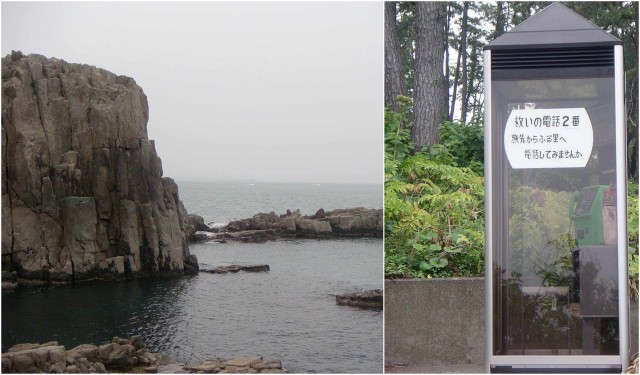
The hilly cliffs of Tojimbo in Fukui Prefecture and their sheer drops into the raging, green Sea of Japan, is a top destination for tourists, but this place is less known for its stunning scenery than for suicide. In its worst, more than 25 people a year have chosen the towering hills of Tojimbo as their final destination; for ending their lives.
The series of basaltic cliffs on the Sea of Japan, located in the Antō part of Mikuni-chō in Sakai, Fukui Prefecture, stretch for 1 km. Why Japanese people pick this place to end their life when they are feeling desperate, nobody knows for sure.
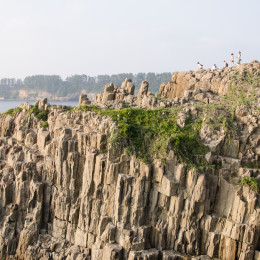
Although, the place was doomed as it from the beginning. According to a legend, corrupt Buddhist priest from Heisen-ji, a local temple, so enraged the populace that they dragged him from the temple to the sea and, at Tōjinbō, threw the priest into the sea. The locals claim that his ghost is still haunting the area.
There is another legend (as depressing as the first one), that claims the name Tōjinbō comes from a dissolute Buddhist monk. According to the legend, a Buddhist monk named Tōjinbō, who was disliked by everyone, fell in love with a beautiful princess named Aya.Tōjinbō was tricked by another admirer of Princess Aya and was pushed off these cliffs. The legend says that ever after that time Tōjinbō’s vengeful ghost would go on a rampage around the same time every year at this place, causing strong winds and rain. Some decades later, an itinerant priest took pity on Tōjinbō and held a memorial service for him. After that, the storms ceased.
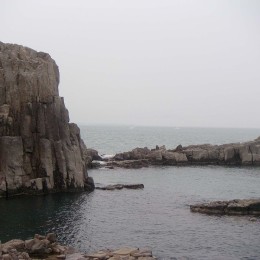
But just before you define these cliffs as the most doomed and depressing place on the planet, there is one phenomenon that brings a glimpse of light in this dark cliffs. Every day a human figure tirelessly stands on the cliff, not in a hesitation, whether to jump or not, but to patrol the area and to prevent suicides.
Yukio Shige, a 70-year-old retired police officer who dedicated 10 years of his life trying to lower the suicide rate in this particular region of Japan.
Shige worked as a police officer for the Fukui Prefectural Police for 42 years, retiring at the age of 60. His final posting was in Tōjinbō in Sakai. He was appalled by the many corpses he had to remove from the ocean. On one of his last patrols before retirement in 2003, he met an elderly Tokyo couple who owned a pub. They had major debt problems and were suicidal. They planned to throw themselves into the sea at sunset. He convinced them not to and called a patrol car to take them to the local welfare bureau. The local authorities simply gave the couple enough money to get to the next town. He received a letter from them, sent shortly before their suicide in a neighbouring prefecture, five days after he had encountered them. He was offended by the coldness of the authorities, and after his retirement began to patrol the cliffs to try and prevent suicides
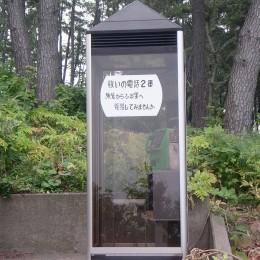
From that on Shige found his calling, he compiled a group of 22 volunteers recruited by the NPO he found. On April 27th, 2004, Shige founded Kokoro ni Hibiku Bunshu Henshukyoku (Publishing bureau for collections of writings that reach the heart), which has continued to work to prevent suicides around Tōjinbō. In 2014, it saved its 500th life
“You can tell, generally, when a solitary wanderer is no mere sightseer. If someone looks troubled, Shige or one of the others approaches and starts a casual conversation: “Hi, where you from?” “Leave me alone, I’ve had enough!”” explains Shige.
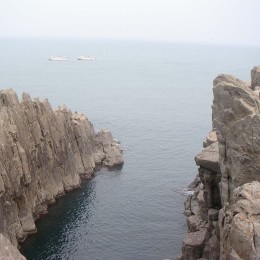
His efforts have helped draw the attention to the Officials in Sakai, the small city in Fukui Prefecture, where Tojimbo is located. They have installed outdoor lighting at the cliffs along with two pay phones and plenty of the 10-yen coins needed to dial up the national suicide hotline.
It really is a responsible and emotionally draining assignment he gave himself 11 years ago, but he proudly has the credit for lowering the suicide rate in Japan.
